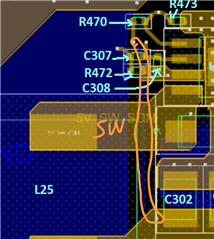- Ask a related questionWhat is a related question?A related question is a question created from another question. When the related question is created, it will be automatically linked to the original question.
This thread has been locked.
If you have a related question, please click the "Ask a related question" button in the top right corner. The newly created question will be automatically linked to this question.
Hi,
We are using the TPS54531DDA for generating a 5V with current requirement of 2.7A (at max load) from 12V to 19V input voltage. at high load condition, we are able to hear the switching noise from this regulator section. we are not able to hear this kind of noise during light load. Could you help me to sort out this issue?
Please see the schematics of regulator design below.
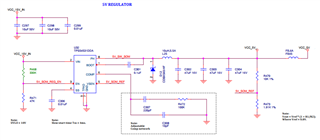
Thanks,
Jab
Hello Jab,
1. Could you please provide SW/Vin/Vout waveforms? I would firstly check whether the switching pulses are stable or not. If the SW pulses were unstable, and oscillation frequency within 20Hz~20kHz audible frequency range, you may hear audible nose. If you saw unstable SW waveform, please adjust Comp network (refer to Webench tool recommended circuit) to make sure SW stable.
2. Could you please check where does the noise come from? From inductor or from MLCC output caps? You can re-solder the inductor, only connect one pin of inductor to board, using a wire to connect the other pin of inductor to board, if the noise could be removed, the noise should come from inductor. Sometimes using different L or Cout may improve audible noise. I saw cases that changing MLCC from big size to smaller-size could solve the MLCC audible noise issue.
3. Could you please share layout file? I will review it.
Hi,
Thanks for your reply,
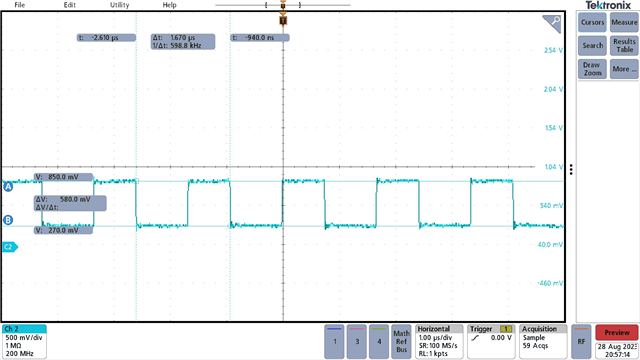
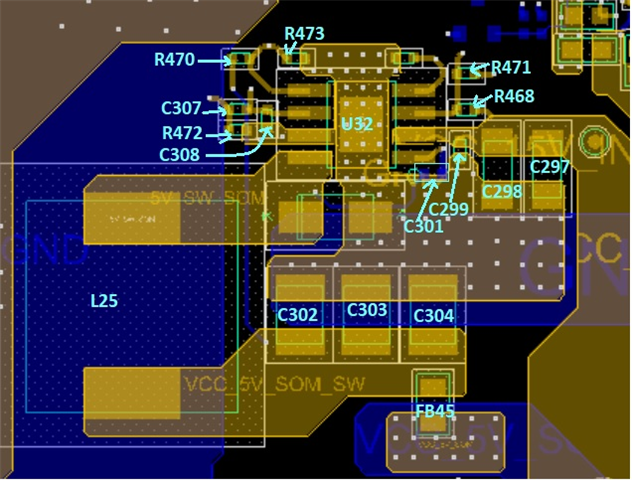
Please let me know if you required any other details.
Thanks,
Jab
Hello Jab,
Thanks for your provided information. My comments are below.
1. Is the waveform captured when you heard audible noise? You may capture Vout ripple waveform, check whether has 20Hz~20kHz low-frequency oscillation.
2. From your description, the audible noise doesn't come from inductor, then it should come from output MLCC caps, not from IC. Because MLCC uses dielectrics with piezoelectric characteristic. Below figure shows when the AC voltage is applied to MLCC, the dielectrics will cause a subtle vibration by expanding and contracting, and the vibration travels to PCB surface. If the AC frequency is within audio-frequency range (20Hz~20kHz), the sound will be perceived by human ear.
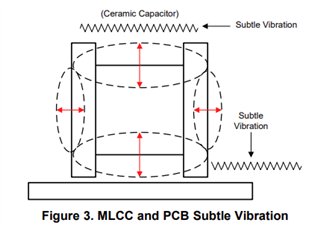
I use webench to generate recommended circuit, your new compensation values are more closer to recommended values. Please use webench recommended circuit firstly.
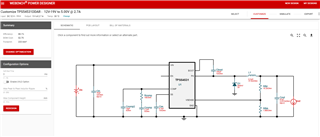
I used your previous value to simulate in webench, the simulation results show low phase margin warning.
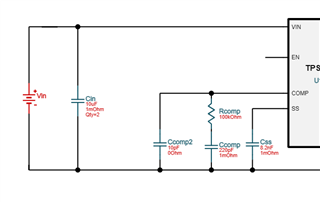
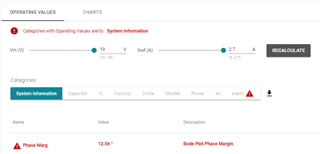
3. The layout is overall OK. But one thing can be optimized that FB sensing trace go through noisy SW node in second layer. FB-pin is a noise-sensitive pin, please put the trace and resistors far away from noisy SW node.
